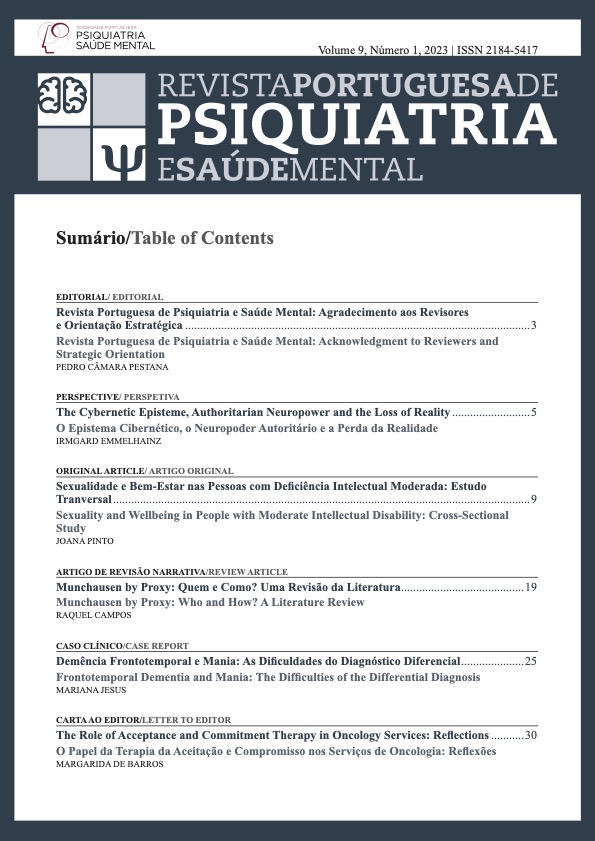Sexuality and Wellbeing in People with Moderate Intellectual Disability: Cross‐ ‐Sectional Study
DOI:
https://doi.org/10.51338/rppsm.420Keywords:
Intellectual Disability, Psychological Well‐Being, Quality of Life, Sexual Health, SexualityAbstract
Introduction: Intellectual disability (ID) has historically been ignored and has only recently begun to receive greater recognition through studies aimed at improving the quality of life of individuals with ID. One area of concern is sexual health, which has been widely neglected, with limited positive experiences and prevalent negative attitudes towards sexuality in this population. This became a prominent issue when the first cases of HIV were reported as a result of frequent sexual abuse. This led to the implementation of sexual education programs. Prior to this, sexuality was repressed by the caregivers and relatives of individuals with ID, and this can still be observed today. This study aims to identify the connections between indicators of sexual health and well‐being of individuals with ID, while also evaluating their levels of knowledge, experiences, needs, sexual attitudes, and their vulnerability to sexual abuse and their assertive responses in situations of sexual coercion.
Material and Methods: We enrolled a total of 86 persons with moderate intellectual disability (49 men 37 women) all aged 18 or older and not institutionalized, from the northern region of Portugal. The instruments used were the Sexuality Knowledge, Experience and Needs Scale for People with Intellectual Disability (SexKen‐ID), which assesses issues related to sexual health, and the Personal Wellbeing Index – Intellectual Disability (PWI‐ID), that evaluates for personal wellbeing.
Results: The results suggest that people with moderate ID have low levels of knowledge, experience, high needs and negative feelings towards sexuality. In terms of sexual abuse, they exhibit limited assertiveness in responding to such situations. There was no significant correlation found between sexuality and wellbeing among individuals with ID.
Conclusion: The limited knowledge about sexuality makes individuals with intellectual disability vulnerable, highlighting the importance of implementing education and wellness programs to promote healthy sexual expression and enhance their ability to handle situations and emotions related to sexual abuse.
Downloads
References
Shree A, Shukla P. Intellectual Disability: Definition, classification, causes and characteristics. Learning Community‐An Int J Educ Soc Develop. 2016;7:9.10. 5958/2231‐458X.2016.00002.6
Patel DR, Apple R, Kanungo S, Akkal A. Narrative review of intellectual disability: definitions, evaluation 14. and principles of treatment. Pediatr Med. 2018;1
SimõesC,SantosS.The Impact of Personal and Environmental Characteristics on Quality of Life of People with Intellectual Disability. Appl Res Qual Life. 2017;12:389‐408.10.1007/s11482‐016‐9466‐7
PORDATA. População residente com deficiência segundo os Censos: total e por tipo de deficiência (2001) [accessed Jun 2022] Available from: https://www.pordata.pt/Portugal/Popula%C3%A7%C3%A3o+residente+com+defici%C3%AAncia+segundo+os+Censos+total+e+por+tipo+de+defici%‐ C3%AAncia+(2001)‐1239. 17.
Bastos OM, Deslandes SF. Sexualidade e o adolescente com deficiência mental: uma revisão bibliográfica. Cie Saúde Coletiva. 2005;10:389‐97.10.1590/S1413‐81232005000200017
Bernert DJ. Sexuality and Disability in the Lives of Women with Intellectual Disabilities. Sex Disabil. 2011;29:129‐41.10.1007/s11195‐010‐9190‐4
Löfgren‐Mårtenson L. “May I?” About Sexuality and Love in the New Generation with Intellectual Disabilities. Sex Disabil. 2004;22:197‐207.10.1023/B:SEDI.0 000039062.73691.cb
Almeida P. A Sexualidade na Deficiência Mental. Saber Educar. 2010;15.10.17346/se.vol15.96
McCabe MP. Sexual Knowledge, Experience and Feelings Among People with Disability. Sex Disabil. 1999 22. ;17:157‐70.10.1023/A:1021476418440
Leutar Z, Mihoković M. Level of Knowledge about Sexuality of People with Mental Disabilities. Sex Disabil. 2007;25:93‐109.10.1007/s11195‐007‐9046‐8
Lin LP, Lin PY, Chu CM, Lin JD. Predictors of caregiver supportive behaviors towards reproductive health care for women with intellectual disabilities. Res Dev Disabil. 2011;32:824‐9.10.1016/j.ridd.2010.10.015
Kijak RJ. A Desire for Love: Considerations on Sexuality and Sexual Education of People With study and in the writing of the article. Intellectual Disability in Poland. Sex Disabil. 2011;29:65‐74.10.1007/s11195‐010‐9184‐2
Van Bourgondien ME, Reichle NC, Palmer A. Sexual behavior in adults with autism. J Autism Dev Disord. 1997;27:113‐25.10.1023/a:1025883622452
Cheng MM, Udry JR. Sexual behaviors of physically disabled adolescents in the United States. J Adolesc Health. 2002;31:48‐58.10.1016/ s1054‐139x(01)00400‐1
McCabe MP, Cummins RA, Reid SB. An empirical study of the sexual abuse of people with intellectual disability. Sex Disabil. 1994;12:297‐306.10.1007/ BF02575321
Hanass‐Hancock J. Disability and HIV/AIDS ‐ a systematic review of literature on Africa. Journal of the International AIDS Society. 2009;12:34.10.1186/1758 ‐2652‐12‐34
Tepper MS. Sexuality and Disability: The Missing Discourse of Pleasure. Sex Disabil. 2000;18:283‐90.1 0.1023/A:1005698311392
Hanass‐Hancock J. Disability and HIV/AIDS ‐ A systematic review of literature on Africa. J Int AIDS Soc. 2009;2:9.10.1186/1758‐2652‐2‐9
Isler A, Arslan F, Beytut D, Conk Z. Sexuality in Adolescents with Intellectual Disabilities. 2009;27:27‐34.10.1007/s11195‐009‐9107‐2
Pinho J, Menezes MdJ, Cardoso M. Educação Sexual da Pessoa com Deficiência Mental: uma revisão Bibliográfica. Revista Contemporânea de Educação 2011;11
Vargem nIR. Educação Sexual na Deficiência Mental. Faro:Universidade do Algarve; 2013.
Servais L. Sexual health care in persons with intellectual disabilities. Ment Retard Dev Disabil Res Rev. 2006;12:48‐56.10.1002/mrdd.20093
Hull TH. Sexual Pleasure and Wellbeing. International Journal Sexual Health. 2008;20:133‐45.10.1080/19317610802157234
Janssen CG, Schuengel C, Stolk J. Perspectives on quality of life of people with intellectual disabilities: the interpretation of discrepancies between clients and caregivers. Qual Life Res. 2005;14:57‐69.10.1007/ s11136‐004‐1692‐z
Giami A. Coping with the sexuality of the disabled: A comparison of the physically disabled and the mentally retarded. Int J Rehabil Res. 1987;10:41‐8. doi: 10.1097/00004356‐198703000‐00004.
Association WM. Declaration of Helsinki: Ethical Principles for Medical Research Involving Human Subjects 2008 [accessed Jun 2022] Available from: https://www.wma.net/wp‐content/uploads/2016/11/DoH‐Oct2008.pdf.
Cummins RA, Lau ALD. Personal Wellbeing Index – Intellectual Disability. Victoria: School of Psychology: Deakin University; 2005.
Groce NE. HIV/AIDS and people with disability. Lancet. 2003;361:1401‐2.10.1016/s0140‐6736(03)13146‐7
McCabe MP, Cummins RA, Deeks AA. Sexuality and Quality of Life Among People with Physical Disability. Sex Disabil. 2000;18(2):115‐23.10.1023/A:10055 62813603








